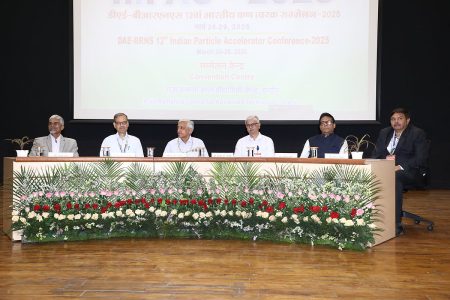‘Growing Need For Accelerators In Industrial & Medical Applications,’ Top Scientists At RRCAT For InPAC-2025 | FP Photo
Indore (Madhya Pradesh): The DAE-BRNS Indian Particle Accelerator Conference-2025 (InPAC-2025) commenced at the Raja Ramanna Centre for Advanced Technology (RRCAT) on March 26 and will continue until March 29 under the aegis of the Indian Society for Particle Accelerators (ISPA). The event is being funded by the Board of Research in Nuclear Science (BRNS), Department of Atomic Energy (DAE).
The conference was inaugurated by KN Vyas, Homi Bhabha Chair Professor at the Department of Atomic Energy and former Chairman of the Atomic Energy Commission. In his address, he emphasised the growing need for accelerators in industrial and medical applications and called for greater participation of young scientists in the field.
The inaugural function was presided over by Unmesh D. Malshe, director of RRCAT, who provided an overview of the accelerator activities at RRCAT, highlighting its contributions to both Indian and international accelerator programmes.
The conference is hosting scientists and engineers from premier national laboratories such as BARC, VECC, TIFR, IUAC, IPR, SAMEER, IGCAR, RRCAT, as well as various universities. International participation includes representatives from leading accelerator laboratories such as Fermi National Laboratory (USA), sharing insights and advancements in the field.
As a major accelerator centre in India, RRCAT has indigenously developed and operates the synchrotron radiation sources Indus-1 & Indus-2, serving as a national facility supporting research in basic sciences and engineering.
The institute also operates an accelerator-based radiation processing facility near the Devi Ahilya Bai Holkar Fruit and Vegetable Mandi Complex, Indore, which is used for the sterilisation of medical devices.
RRCAT continues to advance in accelerator technologies, including free electron lasers (FEL) in terahertz (THz) and infrared (IR) spectral regions, superconducting radio-frequency (SCRF) cavities, cryomodules, high-power RF generators, cryogenics, magnets, ultra-high vacuum systems, precision fabrication, and control instrumentation.
The objective of InPAC-2025 is to serve as a forum for scientific exchange, bringing together professionals actively engaged in particle accelerator science and technology.
The conference will cover all major topics in accelerator technology, featuring invited talks, poster presentations and oral sessions on recent advancements. Dr Sumit Som, director of VECC, Kolkata, was guest of honour and de
livered the keynote address on “CyclotronTechnologies and its Applications in Basic Science Researchand Healthcare”. TA Puntambekar, additional director of RRCAT and chairman, InPAC-2025 Organising Committee, welcomed the guests.

